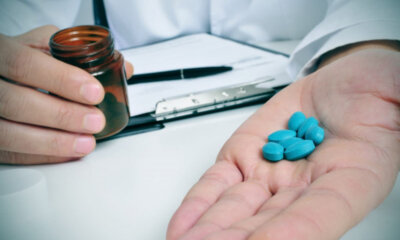What is erectile dysfunction (ED)?
Erectile dysfunction (ED) is a complex but prevalent form of male sexual dysfunction. Any change in your erectile responsiveness that is not considered a normal capability is referred to as having ED. Cenforce review and Cenforce 200 Online can help you overcome erectile dysfunction.
This includes not being able to get an erection sufficiently or for long enough to consider enjoyable intercourse with a companion.
Approximately 30 million American men develop erectile dysfunction unexpectedly. Your erectile dysfunction side effects may change depending on the underlying cause. If you have psychogenic ED, which is ED brought on by stress, tension, or another emotional health problem.
Which elements contribute to erectile dysfunction?
An absence of blood circulation to the penis is the root cause of erectile dysfunction. This happens because the penis’ inner muscle tightens and chokes, preventing blood from entering the penis.
The underlying reasons of ED vary from person to person. Some possible ED causes are as follows:
Mental factors include stress, depression, and other emotional well-being disorders.
Multiple sclerosis, kidney disease, hypertension, cardiovascular infection, atherosclerosis (plaque formation in the arteries), and that’s just the start.
as a result of several medications, including as some circulatory strain meds, antidepressants, seizure prescriptions, opioids and sedatives, antiandrogens (drugs used to treat prostate cancer), and ulcer drugs.
Unnecessary drinking, drug usage, smoking, obesity, and a lack of physical activity are examples of poor lifestyle choices.
With 52% of men between the ages of 40 and 70 experiencing erectile dysfunction, the likelihood of developing ED increases with increasing age.
Is there a link between erectile dysfunction and exercise?
Exercise and eating disorders are recognized to be connected. The likelihood of obtaining ED is recognized to increase when you participate in less actual labor.
A precise study revealed that men who practiced for 160 minutes per week for an extended period of time improved significantly. Erectile dysfunction was reduced as a result of this gathering.
Thus, it appears that exercise reduces ED by improving other aspects of life that may have a direct impact on ED.
According to another study, men who practiced 32.6 MET (metabolic comparable hours) of the week were much less likely to develop ED than men who trained 2.7 MET identical hours of the week. Energy usage during exercise is calculated in MET (metabolic equivalents) throughout long periods of action.
Different sorts of activities have varying MET equivalent hours based on their force.
Practice is also acknowledged to be critical in treating erectile dysfunction once it has developed proactively. In contrast to individuals who led immobile lifestyles, those who practiced for more than four hours per week were significantly more likely to see their ED progress to the next stage.
How is erectile dysfunction caused?
The majority of people can have ED treated quickly and with minimal negative consequences.
Oral PDE5 inhibitors are often used to treat ED . They work by relaxing the muscle in your penis, which increases blood flow to the penis.
Erectile dysfunction can be treated with lifestyle modifications. As previously mentioned, supporting your actual task can help you have an erection. Limiting your use of cigarettes and alcohol can help you have fewer ED side effects.
Non-drug options include penile siphons and vacuum erection devices (VEDs). They work by forcing blood to be sucked into your penis, producing a vacuum around it. Despite the fact that they work, there may be some side effects, such as edema and penile expansion.
Another restorative option is attentive mediation. If you have a severe case of ED, a penile implant may be an option. They are productive and rarely fail.
Visit Site : Genericstrip.com

 Education7 months ago
Education7 months ago
 Health7 months ago
Health7 months ago
 Game7 months ago
Game7 months ago
 Business7 months ago
Business7 months ago
 Tech7 months ago
Tech7 months ago
 Travel7 months ago
Travel7 months ago
 Entertainment7 months ago
Entertainment7 months ago
 Tech7 months ago
Tech7 months ago
















